诗歌的意象翻译——李清照
李清照诗词及注解(精选5篇)

李清照诗词及注解李清照诗词及注解(精选5篇)李清照自幼生活在文学氛围十分浓厚的家庭里,耳濡目染,家学熏陶,加之聪慧颖悟,才华过人,所以“自少年便有诗名,才力华赡,逼近前辈”(王灼《碧鸡漫志》),曾受到当时的文坛名家、苏轼的大弟子晁补之(字无咎)的大力称赞。
下面就是小编给大家带来的李清照诗词及注解,希望能帮助到大家!李清照诗词及注解【篇1】词牌名:武陵春|朝代:宋朝|作者:李清照风住尘香花已尽,日晚倦梳头。
物是人非事事休,欲语泪先流。
闻说双溪春尚好,也拟泛轻舟。
只恐双溪舴艋舟,载不动许多愁。
翻译/译文风停了,尘土中带有落花的香气,百花落尽,花朵化作了香尘,日色已晚还懒于梳头。
风物依旧是原样,但人已经不同,一切事情都完了,想要诉说苦衷,眼泪早已先落下。
听说双溪春光还好,也打算坐只轻舟前往观赏。
只是恐怕漂浮在双溪上的小船,载不动我的许多忧愁。
注释1.风住尘香:风停了,尘土中带有落花的香气。
2.物是人非:景物依旧,人事已变。
此暗指丈夫已死。
3.双溪:浙江武义东阳两江水流至金华,并入婺江,两水合流处叫双溪。
4.拟:打算。
5.舴艋舟:一种形似舴艋的小船。
李清照诗词及注解【篇2】词牌名:如梦令|朝代:宋朝|作者:李清照常记溪亭日暮,沉醉不知归路。
兴尽晚回舟,误入藕花深处。
争渡,争渡,惊起一滩鸥鹭。
翻译/译文依旧记得经常出游溪亭,一玩就到傍晚,但是喝醉而忘记回去的路。
乘舟返回时,迷路进入藕花池的深处。
怎样才能划出去,拼命地划着找路,却惊起了一滩的鸥鹭。
注释①如梦令:词牌名。
②如梦令·常记溪亭日暮:选自《漱玉词》。
③常记:长久记忆。
④溪亭:一说此系济南七十二名泉之一,位于大明湖畔;二说泛指溪边亭阁;三说确指一处叫做“溪亭”的地名(因苏辙在济南时写有《题徐正权秀才城西溪亭》诗);四说系词人原籍章丘明水附近的一处游憩之所,其方位当在历史名山华不注之阳。
⑤藕花:荷花⑥争渡:奋力划船渡过。
⑦鸥鹭:泛指水鸟。
李清照诗词及注解【篇3】词牌名:声声慢|朝代:宋朝|作者:李清照寻寻觅觅,冷冷清清,凄凄惨惨戚戚。
李 清照词中常用的意象有哪些
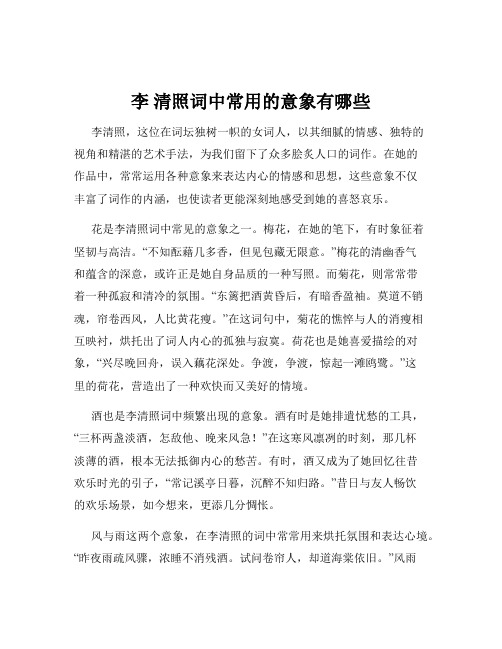
李清照词中常用的意象有哪些李清照,这位在词坛独树一帜的女词人,以其细腻的情感、独特的视角和精湛的艺术手法,为我们留下了众多脍炙人口的词作。
在她的作品中,常常运用各种意象来表达内心的情感和思想,这些意象不仅丰富了词作的内涵,也使读者更能深刻地感受到她的喜怒哀乐。
花是李清照词中常见的意象之一。
梅花,在她的笔下,有时象征着坚韧与高洁。
“不知酝藉几多香,但见包藏无限意。
”梅花的清幽香气和蕴含的深意,或许正是她自身品质的一种写照。
而菊花,则常常带着一种孤寂和清冷的氛围。
“东篱把酒黄昏后,有暗香盈袖。
莫道不销魂,帘卷西风,人比黄花瘦。
”在这词句中,菊花的憔悴与人的消瘦相互映衬,烘托出了词人内心的孤独与寂寞。
荷花也是她喜爱描绘的对象,“兴尽晚回舟,误入藕花深处。
争渡,争渡,惊起一滩鸥鹭。
”这里的荷花,营造出了一种欢快而又美好的情境。
酒也是李清照词中频繁出现的意象。
酒有时是她排遣忧愁的工具,“三杯两盏淡酒,怎敌他、晚来风急!”在这寒风凛冽的时刻,那几杯淡薄的酒,根本无法抵御内心的愁苦。
有时,酒又成为了她回忆往昔欢乐时光的引子,“常记溪亭日暮,沉醉不知归路。
”昔日与友人畅饮的欢乐场景,如今想来,更添几分惆怅。
风与雨这两个意象,在李清照的词中常常用来烘托氛围和表达心境。
“昨夜雨疏风骤,浓睡不消残酒。
试问卷帘人,却道海棠依旧。
”风雨交加的夜晚,引发了她对美好事物易逝的感慨。
而“风住尘香花已尽,日晚倦梳头。
”中的风停花谢,更是尽显她内心的无奈与哀伤。
月这个意象,在李清照的词作中也有着丰富的含义。
“云中谁寄锦书来?雁字回时,月满西楼。
”明月高悬的西楼,寄托着她对远方亲人的思念。
而“寻寻觅觅,冷冷清清,凄凄惨惨戚戚。
乍暖还寒时候,最难将息。
三杯两盏淡酒,怎敌他、晚来风急!雁过也,正伤心,却是旧时相识。
满地黄花堆积,憔悴损,如今有谁堪摘?守着窗儿,独自怎生得黑!梧桐更兼细雨,到黄昏、点点滴滴。
这次第,怎一个愁字了得!”中的冷月,则更增添了整首词的凄凉之感。
李清照诗词中愁的意象分析
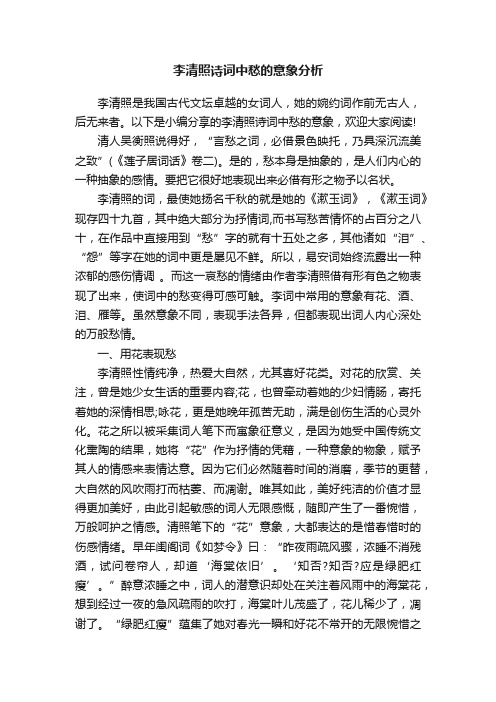
李清照诗词中愁的意象分析李清照是我国古代文坛卓越的女词人,她的婉约词作前无古人,后无来者。
以下是小编分享的李清照诗词中愁的意象,欢迎大家阅读!清人吴衡照说得好,“言愁之词,必借景色映托,乃具深沉流美之致”(《莲子居词话》卷二)。
是的,愁本身是抽象的,是人们内心的一种抽象的感情。
要把它很好地表现出来必借有形之物予以名状。
李清照的词,最使她扬名千秋的就是她的《漱玉词》,《漱玉词》现存四十九首,其中绝大部分为抒情词,而书写愁苦情怀的占百分之八十,在作品中直接用到“愁”字的就有十五处之多,其他诸如“泪”、“怨”等字在她的词中更是屡见不鲜。
所以,易安词始终流露出一种浓郁的感伤情调。
而这一哀愁的情绪由作者李清照借有形有色之物表现了出来,使词中的愁变得可感可触。
李词中常用的意象有花、酒、泪、雁等。
虽然意象不同,表现手法各异,但都表现出词人内心深处的万般愁情。
一、用花表现愁李清照性情纯净,热爱大自然,尤其喜好花类。
对花的欣赏、关注,曾是她少女生话的重要内容;花,也曾牵动着她的少妇情肠,寄托着她的深情相思;咏花,更是她晚年孤苦无助,满是创伤生活的心灵外化。
花之所以被采集词人笔下而寓象征意义,是因为她受中国传统文化熏陶的结果,她将“花”作为抒情的凭藉,一种意象的物象,赋予其人的情感来表情达意。
因为它们必然随着时间的消磨,季节的更替,大自然的风吹雨打而枯萎、而凋谢。
唯其如此,美好纯洁的价值才显得更加美好,由此引起敏感的词人无限感慨,随即产生了一番惋惜,万般呵护之情感。
清照笔下的“花”意象,大都表达的是惜春惜时的伤感情绪。
早年闺阁词《如梦令》曰:“昨夜雨疏风骤,浓睡不消残酒,试问卷帘人,却道‘海棠依旧’。
‘知否?知否?应是绿肥红瘦’。
”醉意浓睡之中,词人的潜意识却处在关注着风雨中的海棠花,想到经过一夜的急风疏雨的吹打,海棠叶儿茂盛了,花儿稀少了,凋谢了。
“绿肥红瘦”蕴集了她对春光一瞬和好花不常开的无限惋惜之情,从中亦不难体味到一个花季少女为这些美好事物的消逝而感伤不已的心情。
李 清照词中的意象运用有哪些特点
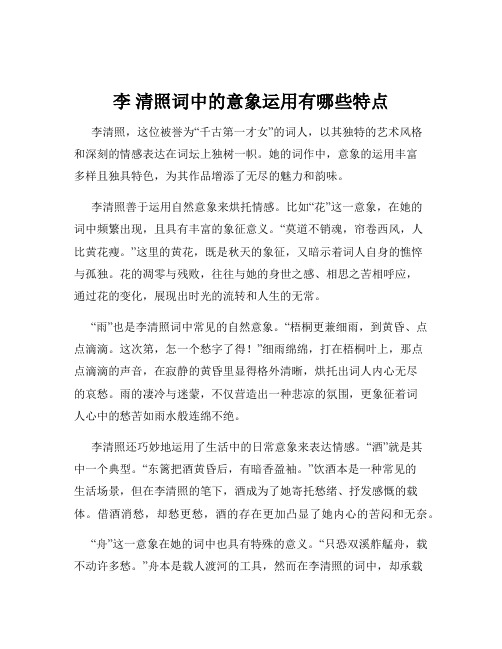
李清照词中的意象运用有哪些特点李清照,这位被誉为“千古第一才女”的词人,以其独特的艺术风格和深刻的情感表达在词坛上独树一帜。
她的词作中,意象的运用丰富多样且独具特色,为其作品增添了无尽的魅力和韵味。
李清照善于运用自然意象来烘托情感。
比如“花”这一意象,在她的词中频繁出现,且具有丰富的象征意义。
“莫道不销魂,帘卷西风,人比黄花瘦。
”这里的黄花,既是秋天的象征,又暗示着词人自身的憔悴与孤独。
花的凋零与残败,往往与她的身世之感、相思之苦相呼应,通过花的变化,展现出时光的流转和人生的无常。
“雨”也是李清照词中常见的自然意象。
“梧桐更兼细雨,到黄昏、点点滴滴。
这次第,怎一个愁字了得!”细雨绵绵,打在梧桐叶上,那点点滴滴的声音,在寂静的黄昏里显得格外清晰,烘托出词人内心无尽的哀愁。
雨的凄冷与迷蒙,不仅营造出一种悲凉的氛围,更象征着词人心中的愁苦如雨水般连绵不绝。
李清照还巧妙地运用了生活中的日常意象来表达情感。
“酒”就是其中一个典型。
“东篱把酒黄昏后,有暗香盈袖。
”饮酒本是一种常见的生活场景,但在李清照的笔下,酒成为了她寄托愁绪、抒发感慨的载体。
借酒消愁,却愁更愁,酒的存在更加凸显了她内心的苦闷和无奈。
“舟”这一意象在她的词中也具有特殊的意义。
“只恐双溪舴艋舟,载不动许多愁。
”舟本是载人渡河的工具,然而在李清照的词中,却承载着她沉重的忧愁。
通过舟无法载动愁绪这一奇特的想象,生动地展现了她内心忧愁的深重和无法排解。
李清照在意象的组合上也别具匠心。
她常常将多个意象巧妙地组合在一起,形成一种相互映衬、相互烘托的效果。
比如“红藕香残玉簟秋。
轻解罗裳,独上兰舟。
云中谁寄锦书来?雁字回时,月满西楼。
”在这里,红藕、玉簟、兰舟、锦书、雁字、西楼等意象相互交织,共同营造出一种孤独、思念的情境。
红藕香残暗示着时光的流逝和美好事物的消逝,玉簟秋则增添了清冷的氛围。
独上兰舟展现出词人的孤寂,而云中锦书、雁字回时又寄托了她对远方亲人的思念,月满西楼更是将这种思念渲染得更加浓郁。
李清照诗词里的意象赏析
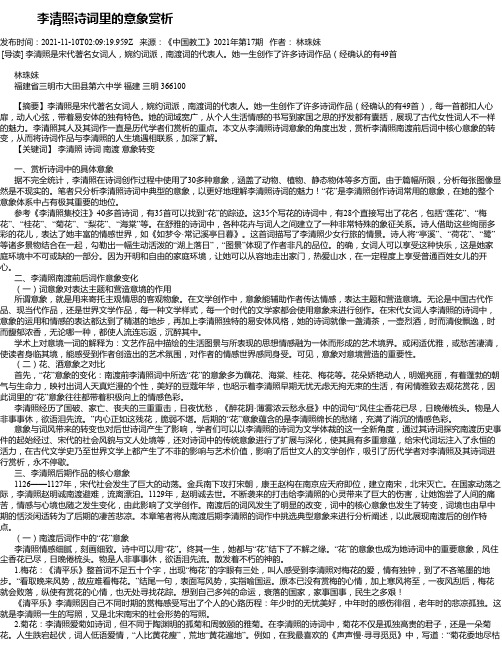
李清照诗词里的意象赏析发布时间:2021-11-10T02:09:19.959Z 来源:《中国教工》2021年第17期作者:林珠妹[导读] 李清照是宋代著名女词人,婉约词派,南渡词的代表人。
她一生创作了许多诗词作品(经确认的有49首林珠妹福建省三明市大田县第六中学福建三明 366100【摘要】李清照是宋代著名女词人,婉约词派,南渡词的代表人。
她一生创作了许多诗词作品(经确认的有49首),每一首都扣人心扉,动人心弦,带着易安体的独有特色。
她的词域宽广,从个人生活情感的书写到家国之思的抒发都有囊括,展现了古代女性词人不一样的魅力。
李清照其人及其词作一直是历代学者们赏析的重点。
本文从李清照诗词意象的角度出发,赏析李清照南渡前后词中核心意象的转变,从而将诗词作品与李清照的人生境遇相联系,加深了解。
【关键词】李清照诗词南渡意象转变一、赏析诗词中的具体意象据不完全统计,李清照在诗词创作过程中使用了30多种意象,涵盖了动物、植物、静态物体等多方面。
由于篇幅所限,分析每张图像显然是不现实的。
笔者只分析李清照诗词中典型的意象,以更好地理解李清照诗词的魅力!“花”是李清照创作诗词常用的意象,在她的整个意象体系中占有极其重要的地位。
参考《李清照集校注》40多首诗词,有35首可以找到“花”的踪迹。
这35个写花的诗词中,有28个直接写出了花名,包括“莲花”、“梅花”、“桂花”、“菊花”、“梨花”、“海棠”等。
在舒雅的诗词中,各种花卉与词人之间建立了一种非常特殊的象征关系。
诗人借助这些绚丽多彩的花儿,表达了她丰富的情感世界,如《如梦令·常记溪亭日暮》。
这首词描写了李清照少女行旅的情景。
诗人将“亭溪”、“荷花”、“鹭”等诸多景物结合在一起,勾勒出一幅生动活泼的“湖上落日”,“图景”体现了作者非凡的品位。
的确,女词人可以享受这种快乐,这是她家庭环境中不可或缺的一部分。
因为开明和自由的家庭环境,让她可以从容地走出家门,热爱山水,在一定程度上享受普通百姓女儿的开心。
李清照声声慢 李清照《声声慢》翻译及赏析
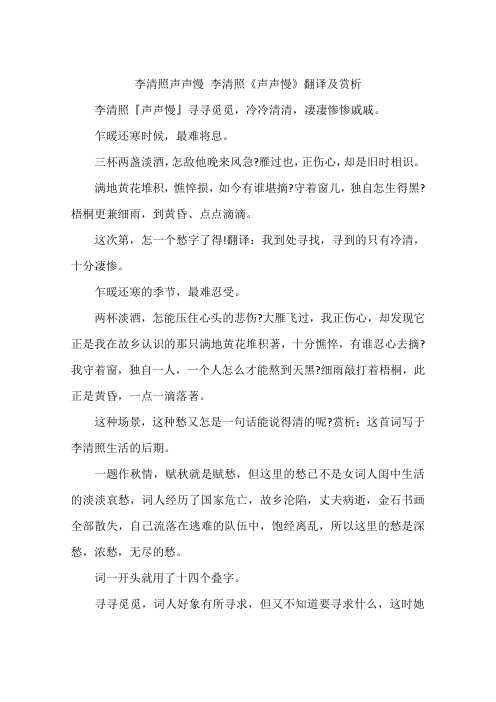
李清照声声慢李清照《声声慢》翻译及赏析李清照『声声慢』寻寻觅觅,冷冷清清,凄凄惨惨戚戚。
乍暖还寒时候,最难将息。
三杯两盏淡酒,怎敌他晚来风急?雁过也,正伤心,却是旧时相识。
满地黄花堆积,憔悴损,如今有谁堪摘?守着窗儿,独自怎生得黑?梧桐更兼细雨,到黄昏、点点滴滴。
这次第,怎一个愁字了得!翻译:我到处寻找,寻到的只有冷清,十分凄惨。
乍暖还寒的季节,最难忍受。
两杯淡酒,怎能压住心头的悲伤?大雁飞过,我正伤心,却发现它正是我在故乡认识的那只满地黄花堆积著,十分憔悴,有谁忍心去摘?我守着窗,独自一人,一个人怎么才能熬到天黑?细雨敲打着梧桐,此正是黄昏,一点一滴落著。
这种场景,这种愁又怎是一句话能说得清的呢?赏析:这首词写于李清照生活的后期。
一题作秋情,赋秋就是赋愁,但这里的愁已不是女词人闺中生活的淡淡哀愁,词人经历了国家危亡,故乡沦陷,丈夫病逝,金石书画全部散失,自己流落在逃难的队伍中,饱经离乱,所以这里的愁是深愁,浓愁,无尽的愁。
词一开头就用了十四个叠字。
寻寻觅觅,词人好象有所寻求,但又不知道要寻求什么,这时她已经历了国破、家亡、夫逝的沉重打击,生活中美好的东西都已不存在了,事实上在现实生活中已经没有什么可寻觅,也没有什么需要寻觅的了,但词人还是希望找点什么寄托自己空虚寂寞的情怀,支撑自己孤苦无助的人生,但寻觅的结果只能是冷冷清清,周围的环境是一片凄清冷落,更让人感到现实的孤苦无援。
凄凄惨惨戚戚,写词人内心的凄凉、悲苦、惨戚的情绪。
这三句都在表现女主人的愁苦无聊,寂寞哀伤,但各有侧重,第一句写神态,第二句写环境,第三句写心情,第二、三句又是第一句寻寻觅觅的结果,冷冷清清,先感于外;凄凄惨惨戚戚,后感于心,进入愁境(吴熊和《唐宋词通论》)。
乍暖还寒时候,最难将息。
刚觉得有点儿暖和却又变冷了,这是秋天的时令特征。
将息,调养。
人在天气多变化时,是很难适应的,更何况是年岁已大,身体衰弱,又遭遇了如此不幸的人,就更是对天气的变化特别敏感,更觉得难以将养适应了。
李清照词中的意象分析
李清照词中的意象分析李清照是南宋杰出的文学家,主张“词别是一家”,其作品风格衰婉而略带豪放,为婉约派代表。
清照词所表达的思想感情与作者的襟怀情趣,很大一部分是通过其词的意象来体现的。
李清照词中意象主要有“花”、“帘”、“酒”、“雁”,这些意象有各自的意义,又有着共同的内涵。
伴随李清照南渡及前后词风的转变,词中意象也产生了一定变化。
关键词:李清照;意象;南渡;变化李清照,号易安居士,山东济南人,生在仕宦之门、诗书之家。
其父李格非官至礼部员外郎,是著名的学者和散文家,善属文,工词章,名列北宋“后四学士”,曾受苏轼的赏识;其母王氏是状元王拱辰的孙女,亦能诗善文。
李清照家中藏书甚丰,父母有较高的文学修养和强烈的文学兴趣,使她自幼受到浓厚文学艺术氛围的熏陶,加之其极富天资、聪敏好学,因而年少时即工书善画,精通音律,但相较而论,以词为长。
李清照所作之词在宋时已有《易安居士文集》、《易安词》专辑刊行,惜均散佚,至明崇祯年间毛晋刻《漱玉词》十七首,为最早的李清照词作刻本。
今留存确凿的李清照词作共有四十五首①,然其中新意奔涌、经典迭出,万千意象被后代文人顿笔激赏、竞相模仿。
清照词中既有春至秋归、山水之乐,也有闺阁心情、离情别绪,更有家难国殇、深愁大悲,几乎涵盖了其整个起落跌宕的人生历程,可是说是这个婉约词人的人生“词史”,因此其中的意象之丰富自不必赘言。
细看李清照的词作,最常出现的意象有四个:“花”、“帘”、“酒”、“雁”。
意象由“意”与“象”两个因素组成,文人对外界有所感,生“意”于心,于是借助诗词文章中的具体的“象”来表达心中之“意”,这样“象”就不仅仅是单纯的事物,而是蕴含作者感情的寄托物。
本文将从李词中的丰富意象剖刀直入,一探究竟。
一、李清照词中的“花”意象在现存李清照的词中,通篇咏花的有六首,其中直接咏梅的词有三首,为《渔家傲·雪里已知春信至》、《玉楼春·红梅》、《满庭芳·残梅》;直接咏“菊”的词有一首,为《多丽·咏白菊》;直接咏“桂”的词有二首,为《鹧鸪天·桂》和《山花子·揉破黄金万点明》。
李清照的词原文赏析及翻译
李清照的词原文赏析及翻译(实用版)编制人:__________________审核人:__________________审批人:__________________编制单位:__________________编制时间:____年____月____日序言下载提示:该文档是本店铺精心编制而成的,希望大家下载后,能够帮助大家解决实际问题。
文档下载后可定制修改,请根据实际需要进行调整和使用,谢谢!并且,本店铺为大家提供各种类型的经典范文,如教学教案、阅读试题、诗歌鉴赏、教学随笔、日记散文、语录句子、报告总结、故事大全、作文大全、其他范文等等,想了解不同范文格式和写法,敬请关注!Download tips: This document is carefully compiled by this editor.I hope that after you download it, it can help you solve practical problems. The document can be customized and modified after downloading, please adjust and use it according to actual needs, thank you!In addition, this shop provides you with various types of classic sample essays, such as teaching lesson plans, reading questions, poetry appreciation, teaching essays, diary essays, quotations sentences, report summaries, stories, essays, other essays, etc. If you want to know the difference Please pay attention to the format and writing of the sample essay!李清照的词原文赏析及翻译李清照的词原文赏析及翻译无论在学习、工作或是生活中,大家都不可避免地要接触到词吧,李清照,宋代女词人,婉约词派代表,有“千古第一才女”之称。
李清照《渔家傲·天接云涛连晓雾》鉴赏及译文参考
李清照《渔家傲·天接云涛连晓雾》鉴赏及译文参考《渔家傲·天接云涛连晓雾》是由李清照所创作的,这首词把真实的生活感受融入梦境,把屈原《离骚》、庄子《逍遥游》以至神话传说谱入宫商,使梦幻与生活、历史与现实融为一体,构成气度恢宏、格调雄奇的意境,充分显示了作者性情中豪放不羁的一面。
下面就是小编给大家带来的,希望能帮助到大家!《渔家傲·天接云涛连晓雾》宋代:李清照天接云涛连晓雾,星河欲转千帆舞。
仿佛梦魂归帝所。
闻天语,殷勤问我归何处。
我报路长嗟日暮,学诗谩有惊人句。
九万里风鹏正举。
风休住,蓬舟吹取三山去!《渔家傲·天接云涛连晓雾》译文水天相接,晨雾蒙蒙笼云涛。
银河转动,像无数的船只在舞动风帆。
梦魂仿佛回天庭,听见天帝在对我说话。
他热情而又有诚意的问我要到哪里去。
我回报天帝路途还很漫长,现在已是黄昏却还未到达。
即使我学诗能写出惊人的句子,又有什么用呢?长空九万里,大鹏冲天飞正高。
风啊!千万别停息,将我这一叶轻舟,直送往蓬莱三仙岛。
《渔家傲·天接云涛连晓雾》注释星河:银河。
转:《历代诗余》作“曙”。
帝所:天帝居住的地方。
天语:天帝的话语。
嗟:慨叹。
报:回答。
谩有:空有。
谩:徒,空。
惊人句,化用《江上值水如海上势聊短述》有“语不惊人死不休”诗句。
九万里:《庄子·逍遥游》中说大鹏乘风飞上九万里高空。
鹏:古代神话传说中的大鸟。
蓬舟:像蓬蒿被风吹转的船。
古人以蓬根被风吹飞,喻飞动。
吹取:吹得。
三山:《史记·封禅书》记载:渤海中有蓬莱,方丈,瀛洲三座仙山,相传为仙人所居住,可以望见,但乘船前往,临近时就被风吹开,终无人能到。
《渔家傲·天接云涛连晓雾》译文及注释二《渔家傲·天接云涛连晓雾》译文天蒙蒙,晨雾蒙蒙笼云涛。
银河欲转,千帆如梭逐浪飘。
梦魂仿佛又回到了天庭,天帝传话善意地相邀。
殷勤地问道:你可有归宿之处?我回报天帝说:路途漫长又叹日暮时不早。
一剪梅李清照翻译及赏析
一剪梅李清照翻译及赏析
《一剪梅》是李清照的代表作,是一首抒情自传式的诗歌,表达了她的孤独与渴望得到安慰和关爱的情结。
《一剪梅》以笔墨流畅、
语句简明、意象深邃、富有情调的语言,吟唱着对梅花的赞颂和对残缺只剩落花犹存的梅花盛开后终究还要凋零和分离的苍凉景象,表达出李清照对人生冷暖无常的深刻感悟。
中文版《一剪梅》:
一剪梅红紫染,凋零在残阳中。
庭院深深晚来披雪,春色宛转碎香风。
片片梅落照江上,叶落无声渐相忘。
晓看红湿处,花重锦官城。
翻译:
A sprig of plum blossoms, dyed red and purple, withers in the fading sunlight.
The deep garden is draped in snow at nightfall, while the spring breeze is fragrant and fleeting.
Fragments of plum blossom petals fall upon the river, their leaves silently fading away from memory.
Through the misty morning, the red-stained blossom remains, heavy in the King City.
译文赏析:《一剪梅》描述的是梅花的凋零,是人生的短暂,映
射出人生的苍凉。
译文表达了李清照对梅花的情感,浓浓的伤感和对
生命的思索,将其变成一种美的体现。
而翻译的语言也是抓住了原文的感受,将伤感的心情描写的深沉而有力,表达得释放出来,让人们感受到这种伤感的意境。
- 1、下载文档前请自行甄别文档内容的完整性,平台不提供额外的编辑、内容补充、找答案等附加服务。
- 2、"仅部分预览"的文档,不可在线预览部分如存在完整性等问题,可反馈申请退款(可完整预览的文档不适用该条件!)。
- 3、如文档侵犯您的权益,请联系客服反馈,我们会尽快为您处理(人工客服工作时间:9:00-18:30)。
江南大学太湖学院本科生毕业设计(论文)题目:Expression of Sense from C-E Translation of Li Qingzhao’s Two Lyrics by Xu Yuanchong语言文学系英语专业学号0654106学生姓名廖静雯指导教师刘燕二〇一〇年三月ContentsAbstract& Key Words (3)摘要 (3)1. Introduction (4)Previous Findings and Researches in This Respect (4)Motivations for Present Study (5)2. Xu Yuanchong and Classical Chinese Lyrics Translation (5)2.1 Translation Theories for Classical Chinese Lyrics (5)2.2 Xu Yuanchong's Theory of Three Beauties (6)3. Sense in Translation of Li Qingzhao’s Two Classical Chinese Lyrics (6)3.1 A Brief Introduction of Li Qingzhao and Her Style (6)3.2 Expression of Sense in Xu Yuanchong's Translation of声声慢 (8)3.3 Expression of Sense in Xu Yuanchong's Translation of渔家傲 (9)3.4 Comparison of Translations of These Two Chinese Lyrics in Terms of Sense (9)4.Conclusion (10)Bibliography (12)Abstract & Key WordsAbstract:C-E translation of Chinese poem especially Chinese lyrics is a difficult task. The success of translation of Chinese poems depends on whether it can approximately express artistic conception of Chinese poems. It is impossible for translator to convey completely the primary taste and artistic conception of Chinese poetry to every reader without a deep understanding of the artistic conception. Not all poets’ style is fixed. We must the correctly apply of translation theory and techniques to explain a poet at different stages of creative state of mind. The expression of sense in poetry translation should not only convey the beauty of poetry, but also become a true port rayal of the poets’ life and mood. This thesis aims to explain how a translator reproduces scenarios based on author’s intent to give readers immersive experience of the author's feelings by comparing Xu Yuanchong's translations of Li Qingzhao’s two lyrics in different style.Key words: English translation of Chinese poetry; sense; lyrics摘要汉诗英译是否成功就在于能否成功的传达意境。
要成功的传达意境是不容易的,许多好的汉语诗歌翻译成英语后总是会失去原作的艺术魅力。
其实要想把诗歌的意境完整的传达,最根本的前提是译者本身对诗歌的意境有深刻透彻的认识。
因为每个诗人的风格不全是固定的,我们要通过正确的运用翻译理论和技巧,把同一位诗人在不同人生阶段创作的心境诠释出来。
意境的翻译不仅要传达诗歌的韵味,而且要成为诗人生活和心境的真实写照。
本文通过比较许渊冲对著名女词人李清照不同阶段的两首风格各异的词的英译,说明如何在理解作品原意的基础上通过翻译来情景再现,让读者身临其境的体会到作者的感受。
关键字:汉诗英译;意境;诗词翻译Expression of Sense from C-E Translation of Li Qingzhao’s Two Lyrics by XuYuanchong1.IntroductionPrevious Findings and Researches in This RespectThe English translation of classical Chinese poetry has gone through nearly a half-century journey since British missionary James League published the English translation of "Book of Songs". Now, the practical English translation of the ancient poetry has achieved gratifying results. There appear so many translators and a lot of English translations of old versions of poetry, which arouses a contention of a hundred schools of thought. In the past 3 decades, the theoretical research of English translation of ancient Chinese poetry has grown from nothing. C-E translation of Chinese poem grows into maturity from a single paradigm to a variety of paradigm, from techniques to the exploration of the theory-building journey. Looking ahead, researchers and practitioners should take the development of Chinese classical culture as their responsibility and continue to strengthen basic research on a variety of paradigms to build a diverse complement of Chinese Poetry Translation Theory system based on the learning from each other.Chinese culture has a long history and is profound. Ancient literati left enough immortal poems to make people amazed. Which has been the focus of contention is how to translate them into English so that westerners can appreciate the beauty of ancient Chinese poetry. Chinese and Western language and culture are quite different; therefore the English translation of ancient Chinese poetry is quite difficult. Nevertheless, we should first be convinced of its translatability, and use the appropriate translation skills to convey their "genuine" to the west in order to promote Chinese culture to the world as far as possible. [1]1.2 Motivations for Present Study"Poetry is a super art of language.”[2] A well-known statement is made by Robert Frost “Poetry is what gets lost in translation”. [3] Poetry translation is a difficult task and it is especially true in the Chinese poetry translation. “Indeed, poetry translation is a creative task.”[4] Burton Raffe l says, “The translated poem should first be a newpoem, a good one, and should be the favor of life, instead of lifeless academic accuracy.”[5]Literary translation can be taken express of the mood of a culture, poetry translation in particular because poetry translation is at a very high state of literary translation. It is the most concise expression of the richest of human emotions and the most complex imagery. The mood in poetry of a nation is usually unique can represent the unique spirit. To translate ancient poetry,the most important thing is to express the sense. However, due to differences between English and Chinese languages, to convey the sense in translation is particularly difficult. Studies found that due to the differences in cultural background of the translator or the different perspectives of cultural images, the sense in the poetry has been destroyed. The old, mediocre image is replaced by the fresh image, resulting in the loss and distortion of cultural imagery. Image formation and transmission requires the participation of translators and readers.In fact, in order to convey a complete conception of poetry, the most fundamental premise is the translator’s deep understanding of the artistic conception.2. Xu Yuanchong and Classical Chinese Lyrics Translation 2.1 Translation Theories for Classical Chinese LyricsIn order to use the proper theory to express the sense of Chinese lyrics in C-E translation, we must have a brief understanding of the theory system.In 2002, the first English translation of the national books (mainly the English translation of classical Chinese poetry) workshop has been held in Shijiazhuang, marking the beginning of building the theory system of English translation of ancient Chinese poetry. Then, in 2003 and 2004, the third national seminar on the English translation of books in Suzhou University and Dalian University of Technology were successively held, a group of the English translations of the ancient poetry, monographs have been published, pushed the theory-building sector into a climax.In 2003, the publication of Professor Zhuo Ying’s "Studies of Chinese Poetry Translation theory” was the first attempt to build theory system of the English translation of ancient poetry. Zhuo Ying built a relatively complete English translation theory system of ancient poetry from the English translation of Chinese Poetry. After a long time of examination and continuous improvement, Professor Xu Yuanchong’s theory of English translation of the ancient poetry formed a highly instructive and more rigorous "Chinese classical poetry translation theory." Xu called his poetry translation theory the "Chinese school" because this theory has condensed the history of Chinese translation history and literature of many masters of the academic thinking. Zhuo Ying’s and Xu Yuanc hong’s theory of English translation of the ancient poetry are both attempt of poetics Translation of Ancient Chinese Poetry paradigm theory-building. These two theoretical systems bring out the best in each other. [6]2.2 Xu Yuanchong's Theory of Three BeautiesOver the past decade, different patterns of theoretical research on translation of ancient Chinese poetry have rivaled in development and are now in the climax of their theoretical constructions. Among them, the poetic pattern is the most developed which represented by Xu Yuanchong. [7]Xu Yuanchong has translated a number of ancient Chinese poetry in order to spread Chinese culture and enhance China’s position in the world literature and made a great contribution. His own theory of translation of the ancient poetry is called “Three Beauties”. To sum up, it is better and quite similar to the shape, translation of literary works of the time to convey the original meaning based on the “Three Beauties” theory was put forward at home and abroad and has aroused widespread influence.Xu Yuanchong holds the view that English translation of the ancient poetry must try to express the original meaning of the pome. However, in his view, among the "Three Beauties", the most important is "beauty in sense" followed by "beauty in sound", then the "beauty in style”. Due to differences in both languages, as well as the cultural, historical, ideological and other differences, it is very difficult to express the original “beaut y in sense "fully. Xu Yuanchong considered that the main thing of C-E translation of the ancient poetry is the contradiction between truth and beauty. If the truth and beauty can be unified, it will be perfect. He pointed out: "translation of literature, not only to understand and make others to understand, not only to enjoy but also to let other people enjoy, not only to understand and enjoy but also be able to feast for the eyes and can also be enjoyable for others.”Professor Xu Yuanchong carefully sketched out the original poem and the translation between the Eastern and Western art and culture understanding and harmony lines with deep foundation of both Chinese and English languages and capture the beauty of poetry in translation.[8]3.Sense in Translation of Li Qingzhao’s Two Classical Chinese Lyrics3.1 A Brief Introduction of Li Qingzhao and Her StyleHere, I’d like to give you a brief introduction of Li Qingzhao so that we can understand the sense in her works easier.As we all know, Li Qingzhao is an outstanding female Chinese poet and literature writer of Song Dynasty. Her work contains the lofty exquisite sentiment and the social culture environment. She saw poetry as especially important and congenial because itrevolutionized their existence. She used poetry as a vehicle to voice some frustrations with their lower status as women and was able to turn cultural and social disadvantages into creative advantages in poetry writing. Li Qingzhao’s words, with women's unique delicate, which makes her graceful to send representatives and express all the emotions in women's lives and the joys and sorrows. The creation of her works can be divided into two parts. The first part, her work expressed soft and slight emotion while the second part changed to gloomy sorrowful feelings and became too worry about the country. The reason her works have a strong sense of reality is the emotional words are her personal experience. Since her works and her life have such close links and causal relations, then trace the trajectory of her life in order to more deeply understand the mood is indispensable. [9]3.2 Expression of Sense in Xu Yuanchong's Translation of声声慢《声声慢》——李清照寻寻觅觅,冷冷清清,凄凄惨惨戚戚乍暖还寒时候,最难将息三杯两盏淡酒,怎敌他晚来风急?雁过也,正伤心却是旧时相识满地黄花堆积,憔悴损而今有谁堪摘?守着窗儿,独自怎生得黑?梧桐更兼细雨,到黄昏点点滴滴这次第,怎一个愁字了得!Translated by Xu Yuanchong:Tune:"Slow,slow song"I look for what I miss;I know not what it is.I feel so sad, so drear,So lonely, without cheer.How hard is itTo keep me fitIn this lingering cold!Hardly warmed upBy cup on cupOf wine so dry,Oh, how could IEndure at dusk the driftOf wind so swift?It breaks my heart, alas!To see the wild geese pass,For they are my acquaintances of old.The ground is covered with yellow flowers.Faded and fallen in showers.Who will pick them up now?Sitting alone at the window, howCould I but quickenThe pace of darkness that won't thicken?On plane's broad leaves a fine rain drizzlesAs twilight grizzles.Oh, what can I do with a griefBeyond belief? [10]“Miss”, what did she miss? Losing her husband deeply human loneliness and boredom of life. In such a situation, the scenes of the sad events of the past emerge in her mind, what a miserable experience, unhappy and extremely sad. It has pairs of overlapping words, women were widowed after the word psychological process of change, but also highly summed up her deep sorrow and old age miserable. “so sad, so drear, s o lonely”, the three”so” express her miserable feeling lively. Such unhappy situation is can’t be deduced in a short period of time, and it was mixed feelings and long-term accumulation.” Sitting alone at the window” look forward different ways of life and the death of her hate. The scene of night has been flooded, how can she endure such torment.”On plane's broad leaves a fi ne rain drizzles”her depressed mood had a more humid due to continuous drizzle, not only wet, it "minor", endlessly dropping on the leaves and the window, which is in fact dropping on her broken heart.” Beyond belief?” this sentence point out the main idea of the poem. Apparently left a imagination to the readers. Imagine a huge world, full of grievances and actually no people or even an animal that can understand her feelings. The autumn wind ravaged her thin body; a light rain hurt her bleeding hearts. Such unhappy situation, how can a woman bear? [11]3.3 Expression of Sense in Xu Yuanchong's Translation of夏日绝句夏日绝句——李清照生当作人杰,死亦为鬼雄。
